The Clackamas River Invasive Species Partnership (CRISP) was recently awarded funds totaling $431,250 from Portland General Electric (PGE) through the Clackamas River Hydroelectric Project Mitigation and Enhancement Fund. This award adds to the other contributions from CRISP partners totaling $1,168,750 to implement a comprehensive plan for coordinating the management of invasive weeds in the Clackamas River Basin.
Invasive Weeds Affect Us All
 Invasive weeds cost Oregon residents millions of dollars each year by reducing the productivity of farmland and decreasing property values, as well as impairing water quality and degrading natural areas important for fish and wildlife. The partnership goals are to mitigate these impacts by helping agencies, organizations, and private landowners work more effectively together to improve these conditions.
Invasive weeds cost Oregon residents millions of dollars each year by reducing the productivity of farmland and decreasing property values, as well as impairing water quality and degrading natural areas important for fish and wildlife. The partnership goals are to mitigate these impacts by helping agencies, organizations, and private landowners work more effectively together to improve these conditions.
“Initial efforts in implementing the goals of the CRISP project will focus on targeted areas of the watershed where partners can begin working together across property lines to improve invasive species management ,” states Sam Leininger, manager of the Clackamas Soil and Water Conservation District’s WeedWise program. “The CRISP partners have identified areas in four priority subbasins where we can hit the ground running and immediately improve conditions in the watershed.”
What Landowners Should Expect
The first step in this project will include landowner outreach to request access along the Clackamas River and its tributaries to conduct site surveys for priority invasive weeds. The survey work will then allow the CRISP partners to coordinate invasive species treatment and restoration efforts where necessary. The treatment and restoration on a property may take several years.
“There are a long list of partners that are contributing their time and effort to this project,” says Leininger. “The CRISP participating partners include the Clackamas Soil and Water Conservation District, the Clackamas River Basin Council, Metro, the 4-County Cooperative Weed Management Area, Bureau of Land Management, Clackamas County Parks, Clackamas County Water Environment Services, Natural Resource Conservation Service, North Clackamas Parks and Recreation District, Oregon Department of Agriculture Noxious Weed Control Program, Oregon Parks and Recreation Department, Portland General Electric, and the United States Forest Service. The CRISP project will help to build upon existing efforts within the Clackamas watershed and ensure that we can all do our work in a better way.”
To find out more about the CRISP project, please visit our Weedwise page.

